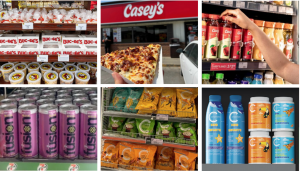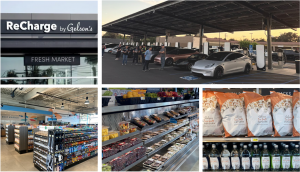The Growing Opportunity for Private Brands in Convenience Retail
In today’s fast-paced world, convenience stores are a haven for impulse purchases, especially when it comes to tobacco, snacks and beverages. However, the role of convenience stores is evolving. The store, and not fuel, is slowly becoming the primary driver of store visits as more consumers transition to EVs. The dominance of cigarette sales is also beginning to decline as food service takes on a greater share of sales as consumers are now turning to c-stores for top-up grocery shopping and quick, prepared meals.
In light of this, we’re seeing ever-larger c-stores with wider assortments than ever. Buc-ee’s is pushing the envelope with stores that exceed 65,000 square feet. Clearly, the role of c-stores is changing and these shifts present a significant opportunity for private brands to help accelerate convenience retail foot traffic and cart size. Based on our experience building Private Brands for the past 25 years, these are the opportunities we see.

Unique and Iconic Products
Developing private brand products that become synonymous with the store itself can set a convenience store apart from the competition. Products like Buc-ee’s Beaver Nuggets or Casey’s breakfast pizza have achieved cult status, drawing customers from far and wide. These products have become part of the brand’s identity and offer something that can’t be found anywhere else.
And c-stores need not limit themselves to the traditional food mainstays of beverages, salty snacks and candy. Younger consumers are eschewing the traditional “three square meals a day” routine, seeking protein-rich and healthy snacks to replace one or more meals. This trend has given rise to such offerings as Krispy Krunchy Chicken, a fried chicken QSR brand built to operate inside c-stores that now has over 2,700 locations. Alta Bradford, former Kwik Trip Brand Design Manager, points to the rise in chicken sales at c-stores and observes that “it shows that customers will shift perceptions of what they should purchase at a c-store vs what they will purchase if quality, taste and convenience are provided.”
Such iconic products create a loyal customer base as customers will often go out of their way to visit a store that offers something unique.

Strategically Positioned for Innovation and Trial
The average convenience store shopper visits at least three times a week. This presents an opportunity to introduce innovative new products as consumers enjoy the treasure hunt for those seeking a little indulgence.
With over 165 million daily visits across more than 150,000 stores in the U.S., convenience stores provide an excellent platform for consumer packaged goods (CPGs) to rapidly test new products. These operators tend to be more agile than traditional grocery retailers. “The existing footprint of convenience stores is set up for changing products fairly quickly,” says Alta Bradford. “It’s a perfect setup to create dynamic test markets for new foods that meet the ‘better for you’, keto, gluten-free demands.”
Private brands enhance this landscape by offering a strategic advantage in profitability, thanks to their higher profit margins. Beyond simply offsetting high swipe fees, this financial flexibility allows convenience stores to implement attractive promotions, like BOGO deals, which encourage customers to buy more items and increase the average transaction value.
Additionally, most convenience stores have established loyalty programs, providing another effective avenue to drive product trial and customer engagement. Bradford adds “given the large number of captive loyalty members, it offers a great system to push trial and reward repurchase.”

Aligning with Consumer Needs
A well-curated portfolio of private brands can effectively communicate the convenience store’s commitment to meeting diverse consumer needs. By offering products that cater to specific consumer demand, stores can position themselves as a one-stop shop for various occasions and preferences.
For instance, unique fast food meal options help attract the growing segment of consumers turning to c-stores rather than traditional QSRs. Healthy snacking options can attract health-conscious consumers, while budget-friendly alternatives can draw in price-sensitive shoppers. Additionally, products that highlight local flavors or sustainable practices can attract environmentally conscious customers and those interested in supporting local businesses.
Moreover, with emerging new use cases come new opportunities. As the growing population of EV owners look to charge their vehicles away from home, c-stores can offer more complete meal options and lounges to make use of the time. Grocer Gelson’s has partnered with EV charging center operator Rove to create ReCharge by Gelson’s, a premium convenience format that offers a large mix of national and private brand foods, beverages, meal options and convenience items.

High-Impact Categories for Private Brand Development
If you’re thinking of investing in the development of a Private Brand program, some quick-win categories to consider are:
• Snacks and Beverages: The main-stay of any c-store assortment, these high-demand and frequent purchase items are ideal for private brand development. They attract regular customers and drive consistent sales. There is tremendous opportunity to quickly seize on-trend opportunities with unique offerings (e.g. dirty sodas) while providing opportunities to stand out from competitors with the same National Brand assortment.
• Prepared Foods: Convenience and quality are key drivers in the prepared foods category as consumers eat on the go. Unique and news-worthy ready-to-eat meals can boost sales and attract busy consumers.
• Health and Wellness: Tapping into the growing trend for healthier options, this category can enhance your store’s reputation and attract health-conscious customers or consumers with specific dietary or ethnically-driven nutritional requirements. This has typically been an underserved segment in the c-store category.

The Opportunity for Private Brands in Convenience Retail
Private brands offer some of the best vehicles to thrive and expand in today’s evolving convenience retail landscape. The agility to rapidly test and adapt to emerging trends is a competitive advantage, while loyalty programs are a tremendous asset to stimulate trial.
By focusing on innovative and unique products that cater to today’s on-the-go consumers—such as indulgent snacks and health-conscious options—c-stores can differentiate themselves. Ultimately, private brands are a key strategy for convenience stores to rapidly seize new opportunities, grow store traffic and grow transaction value.